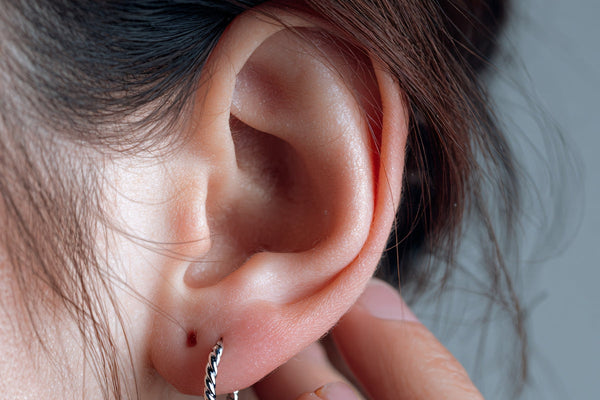
Mastoiditis is a rare but serious ear infection that affects the mastoid bone, which sits just behind the ear. It usually develops when a middle ear infection (otitis media) spreads to the mastoid bone, causing inflammation and fluid build-up. Although it sounds alarming, mastoiditis can be successfully treated with prompt medical care.
At Leightons, we understand that ear pain and swelling can be worrying. Our audiologists are here to check your ear health, explain what’s happening, and help guide you to the right care if an infection is suspected.
What is mastoiditis?
The mastoid bone is part of your skull and contains small air-filled spaces that help drain the middle ear. When bacteria from an untreated or severe ear infection spread to this bone, it can become inflamed and filled with infected fluid. This condition is known as mastoiditis.
If not treated quickly, the infection can cause pain, swelling, and in some cases, damage to nearby structures - which is why early diagnosis and medical treatment are essential.
What causes mastoiditis?
Mastoiditis most often develops as a complication of a middle ear infection that hasn’t fully cleared. When bacteria remain trapped in the middle ear, they can spread into the mastoid bone, causing inflammation and infection.
Common causes and contributing factors include:
- Untreated or chronic ear infections
- Bacterial infection spreading from the middle ear
- Recurrent infections weakening ear tissues
- Poor ear drainage due to Eustachian Tube Dysfunction
Mastoiditis can occur at any age but is more common in children, as their ear structures are still developing.
Common symptoms of mastoiditis
Mastoiditis symptoms can appear suddenly and may follow an ear infection that hasn’t fully resolved. Common signs include:
- Severe, persistent ear pain
- Swelling or redness behind the ear
- Ear discharge (sometimes thick or pus-like)
- Fever and feeling unwell
- Hearing loss in the affected ear
- Headache or dizziness
In some cases, the ear may appear pushed forward due to swelling behind it. Because mastoiditis can worsen quickly, it’s important to seek medical attention if you notice these symptoms.
How is mastoiditis diagnosed?
A GP or ENT specialist can diagnose mastoiditis by examining the ear and checking for inflammation, swelling, or discharge. Tests may include:
- Otoscopy: Looking inside the ear to assess infection
- Hearing test (audiogram): Checking if hearing has been affected
- CT scan: To confirm if the infection has spread to the mastoid bone
- Blood tests: To detect signs of infection
Early diagnosis allows for quicker treatment and prevents complications.
Treatment for mastoiditis
Treatment aims to remove the infection, relieve symptoms, and prevent further spread. Depending on the severity, this may involve:
- Antibiotics: Usually given intravenously (via a drip) to control the infection
- Ear drainage: A small procedure to remove infected fluid or pus
- Surgery (mastoidectomy): In more serious cases, part of the infected bone may be removed to stop the infection from spreading
With prompt treatment, most people recover fully and experience no long-term hearing damage.
Preventing mastoiditis
The best way to prevent mastoiditis is by treating ear infections early and avoiding irritation to the ear canal. Simple steps include:
- Seek medical advice for any ear infection that lasts more than a few days
- Avoid inserting objects like cotton buds into your ears
- Keep ears dry and clean, especially after swimming
- Attend regular ear health checks to monitor your ear condition if you’re prone to infections
By managing ear health proactively, you can reduce the risk of complications like mastoiditis.
How Leightons can help
At Leightons, we provide ear health checks and free hearing assessments to help identify infections early and support your recovery after treatment. Our audiologists can:
- Examine your ears safely for signs of infection or inflammation
- Carry out hearing tests to check for any hearing changes
- Refer you to an ENT specialist for medical treatment if necessary
- Offer aftercare and follow-up checks to monitor your ear health after recovery
We’re here to help you understand your symptoms, protect your hearing, and feel confident in your ear health.
Book your free hearing assessment today and take the first step toward clearer, healthier hearing.







